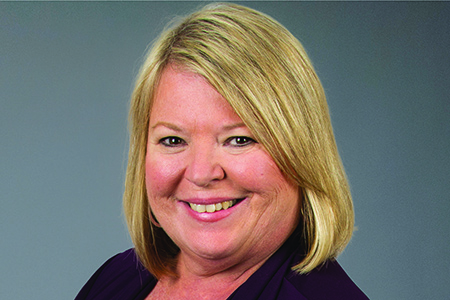Patients Pay It Forward With My Mentor Connections
By Janet Kerrigan
 There’s never a dull moment for a nurse in the critical care unit (CCU). This was especially true when I felt a stabbing pain in my chest and shoulder and collapsed during a 12-hour shift. My colleagues quickly brought me to the emergency room where doctors were convinced I was having a heart attack, but a blood test and bone marrow biopsy revealed my diagnosis: multiple myeloma.
There’s never a dull moment for a nurse in the critical care unit (CCU). This was especially true when I felt a stabbing pain in my chest and shoulder and collapsed during a 12-hour shift. My colleagues quickly brought me to the emergency room where doctors were convinced I was having a heart attack, but a blood test and bone marrow biopsy revealed my diagnosis: multiple myeloma.
Multiple myeloma is a rare blood cancer that arises from the plasma cells, a type of white blood cell which is made in the bone marrow. These plasma cells become abnormal, multiply, and release a type of antibody known as paraprotein, which causes symptoms of the disease.
Following my diagnosis, I felt like a fog had settled over me, and I struggled to make sense of this new reality. After meeting with my doctor and deciding on a treatment plan, I was able to return to work in the CCU. On days when I wasn’t a patient undergoing treatment myself, I was caring for others facing their own medical challenges. Eventually, I had to endure the hardest part of my multiple myeloma journey and end a career I loved due to my disease.
During my treatment, I was grateful for my support system of family and close friends. They stood by me through the physical challenges of undergoing and recovering from my stem cell transplant and the emotional challenges of wrapping my head around my diagnosis. I am forever thankful for their continued support and understand not everyone is as lucky as I am.
A strong network of support is critical to helping multiple myeloma patients navigate their disease. It is also important to connect with other people with multiple myeloma, a challenge for people who don’t know where to go to connect with other patients.
Thankfully, Takeda has created a unique platform — My Mentor Connections — that offers those living with multiple myeloma and their caregivers the opportunity to connect with a patient or caregiver mentor by phone and receive support and encouragement. The program connects participants with patient peer mentors at times that they’re available and ready to talk, without the need to travel to a program or support group. There is no cost associated with enrolling in My Mentor Connections, making it easily accessible to anyone.
I have been a patient mentor for more than three years. Through my work with My Mentor Connections, patients have the opportunity to speak with me one-on-one to ask questions and help ease the stress of their diagnosis. On one call in particular, I was able to reassure a woman who was preparing to undergo a stem cell transplant. She was understandably terrified, and I spent our session listening to her fears and providing encouragement. I’ll never forget our first call following the transplant when she expressed her profound gratitude. I’m proud to be a valuable resource for patients who need a sympathetic ear, and I have found a sense of purpose through my role as a patient mentor.
Since its creation, My Mentor Connections has enrolled more than 270 multiple myeloma patients, providing them with individualized counseling with a mentor and access to information on a range of topics, including disability and legal protections, financial planning, and tips on how to discuss their diagnosis with their family.
Looking back on when I was first diagnosed, I was devastated by my diagnosis and early retirement. Now, I’m comforted knowing there are other ways I can support people in need. Through my work with My Mentor Connections, the fog I experienced has been lifted, and my goal is to help lift that fog from others as well.
JANET KERRIGAN became a mentor for patients with multiple myeloma after retiring from her career as a nurse. She founded and leads a multiple myeloma support group in Myrtle Beach, SC.
